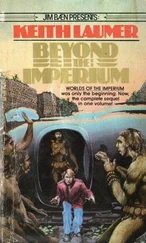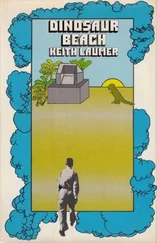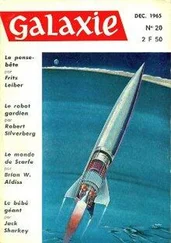I pushed through the iron gates of my house, wheezing like a blown boiler from the run. I stared at the blank black windows, feeling the impalacable air of abandonment, desolation—of utter vacantness. I went on up the drive, taking in the bare stretch of dirt that had been verdant only hours before. Where the poplars had stood, curious foot-wide pits showed black against the grey soil. Only a scatter of dead leaves was left to remind me that once trees had stood here. The crunch of my feet on the gravel was loud. I stepped off onto the former lawn, felt my feet sink into the dry, crumbling earth. At the steps, I looked back. Only my trail of footmarks showed that life had ever existed here—those, and a scatter of dead insects under the carriage lamps. The door opened. I pushed inside, stood savoring the funereal hush, my heart thudding painfully, high in my chest.
“Barbro!” I called. My voice was a dry croak—a croak of cold fear. I ran along the unlighted hall, went up the stairs four at a time, slammed through the sitting room door, on through into the bedroom. I found only silence, an aching stillness in which the sounds of my passage seemed to echo with a shocked reproach. I stumbled out of the room, yelling for Luc, not really expecting an answer now, yelling to break the awful, ominous stillness, the fear of what I might find in the dark, dead rooms.
I searched room by room, went back and tried the closets, shouting, slamming doors wide, not fighting the panic that was welling up inside me, but giving it vent in violent action.
There was nothing. Every room was in perfect order, every piece of furniture in its accustomed place, every drape discreetly drawn, every dish and book and garment undisturbed—but on the marble mantelpiece, the brass clock sat silent, its tick stilled. And in the pots where the broad-leafed plants had lent their touch of green, only the dead soil remained. I stood in the center of the dark library, staring out at the grim, metallic glow of the night sky, feeling the silence flow back in like a tangible thing, trying now to regain my control, to accept the truth: Barbro was gone—along with every other living thing in the Imperial capital.
I didn’t notice the sound at first. I was sitting in the empty drawing room, staring out past the edge of heavy brocaded drapes at the empty street, listening to the thud of my empty heart…
Then it penetrated: a steady thumping, faint, far away—but a sound—in the silent city. I jumped up, made it to the door and was out on the steps before the idea of caution occurred to me. The thumping was clearer now: a rhythmic slap, like the feet of marching troops, coming closer—
I saw them then, a flicker of movement through the iron spears of the fence. I faded back inside, watched from the darkness as they swung past, four abreast, big men in drab, shapeless coveralls. I tried to estimate their number. Perhaps two hundred, some laden with heavy packs, some with rifle-like weapons, one or two being helped by their comrades. They’d seen action somewhere tonight.
The last of them passed, and I ran softly down the drive. Keeping to the shelter of the buildings along the avenue, I followed a hundred yards behind them.
The first, stunning blow was past now, leaving me with a curious sense of detachment. The detachment of the sole survivor. The troop ahead swung along Nybroviken, grim, high-shouldered marchers a head taller than my six feet, not singing, not talking—just marching, block after block, past empty cars, empty buildings, empty parks—and a dead cat, lying in the gutter. I paused, stared at the ruffled, pathetic cadaver.
They turned left into Uppsalavagen—and I realized then where they were headed—to the Net Terminus Building at Stallmastargarden. I was watching from the shelter of a massive oak a hundred yards away as the end of the column turned in at the ornate gate, and disappeared beyond the massive portal that had been smashed from its hinges. One man dropped off, took up a post at the entry.
I crossed the street silently, followed the walk around to the side entrance, wasted a few seconds wishing for the keys in my safe back at the house, then headed for the back of the building. Stumbling through denuded flower beds, I followed the line of the wall, barely visible in the blackish light—a light that seemed, curiously, to shine upward from the ground rather than impinge from the starless sky. A masonry wall barred my way. I jumped, caught the top edge, pulled myself over, dropped into the paved court behind the Terminal. Half a dozen boxy wheeled shuttles were parked here, of the special type used for work in some of the nearer A-lines—worlds with Common History dates only a few centuries in the past, where other Stockholms existed with streets in which a disguised delivery van could move unnoticed.
One of the vehicles was close to the building wall. I climbed up on its hood, reached, tried to lift the wide, metal frame, double-hung window. It didn’t budge. I went back down, fumbled in the dark under the shuttle’s dash, brought out the standard tool kit, found a hammer, scrambled back up, and as gently as I could, smashed the glass from the frame. It made a hell of a racket. I stood listening, half expecting to hear indignant voices calling questions, but the only sound was my own breathing, and a creak from the shuttle’s springs as I shifted my weight.
The room I clambered into was a maintenance shop, lined with long workbenches littered with disassembled shuttle components, its walls hung with tools and equipment. I went out through the door at the far end of the room, along the corridor of the big double doors leading into the garages. Faint sounds came from within. I eased the door open a foot, slipped inside, into the echoing stillness of the wide, high vaulted depot. A double row of Net shuttles reared up in the gloom—heavy, ten-man machines, smaller three-man scouts, a pair of light new-model single-seaters at the far end of the line.
And beyond them—dwarfing them—a row of dark blocky machines of strange design, massive and ugly as garbage scows, illogically dumped here among the elegantly decorated vehicles of the Imperial TNL service. Dark figures moved around the strange machines, forming up into groups beside each heavy transport, responding to gestures and an occasional grunted command. I walked along behind the parked shuttles, eased forward between two from which I had a clear view of the proceedings.
The doors to the first of the five alien machines were open. As I watched, a suited man clambered in, followed by the next in line. The troops—whoever they were—were reembarking. They were clumsy, slope-shouldered heavyweights, covered from head to toe in baggy, dull grey suits with dark glass faceplates. One of the Imperial machines was impeding the smooth flow of the moving column; two of the intruders stepped to it, gripped it by its near side runner, and, with one heave, tipped it up, dumped it over on its side with a heavy slam and a tinkle of breaking glass. I felt myself edging farther back out of sight; the scout weighed a good two tons.
The first shuttle was loaded now. The line of men shuffled along to the next and continued loading. Time was slipping past. In another ten minutes all the suited men would be aboard their machines, gone—back to whatever world-line they had come from. It was clear that these were invaders from the Net—a race of men, unknown to Imperial authorities, who possessed an M-C drive of their own. Men who were my only link with the vanished inhabitants of desolated Stockholm Zero-zero. Waiting here wouldn’t help; I had to follow them, learn what I could…
I took a bracing lungful of the stale Terminal air and stepped out of my hiding place, feeling as exposed as a rat between holes as I moved along the wall, putting distance between myself and the strangers. My objective was one of the two-man scouts—a fast, maneuverable machine with adequate armament and the latest in instrumentation. I reached it, got the door open with no more than a rattle of the latch that sent my stomach crowding up under my ribs; but there was no alarm.
Читать дальше












